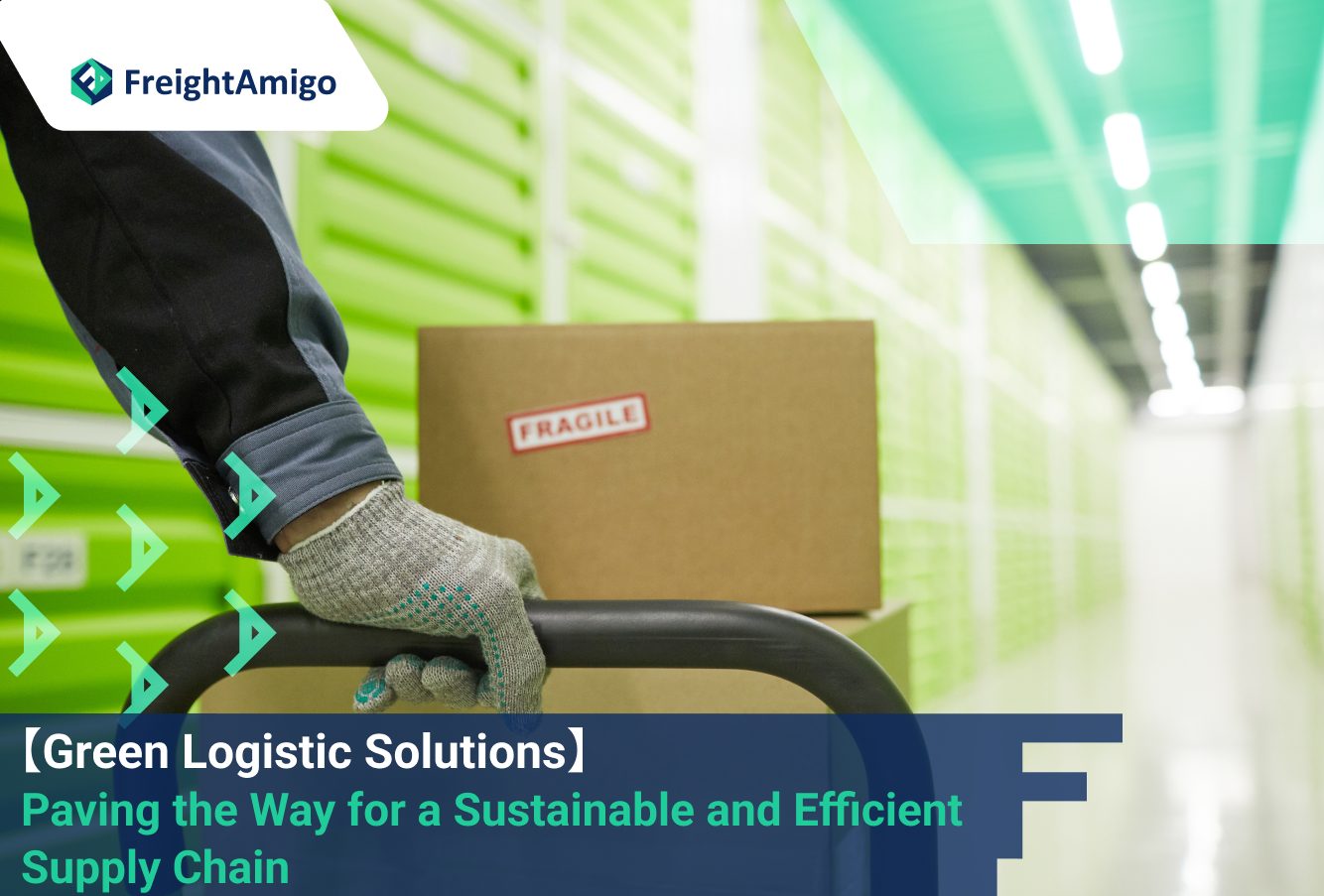Green Logistics Solutions :
Paving the Way for a Sustainable and Efficient Supply Chain
February 6th, 2024: Jacob Leung – Marketing Analyst at FreightAmigo
Green logistics, also known as sustainable logistics or eco-friendly logistics, is a concept that focuses on minimizing the environmental impact of logistics activities while maintaining efficient supply chain operations. It involves the implementation of environmentally friendly practices and technologies throughout the entire logistics process, from sourcing raw materials to delivering finished products. With the growing awareness of climate change and the need for sustainable business practices, green logistics has become a crucial aspect of modern-day supply chain management.
Want To Achieve sustainable development goals in your business?
The Importance of Green Logistics in Business
In today’s business landscape, companies are increasingly recognizing the importance of incorporating green logistics into their operations. This is driven by several factors, including growing customer demand for environmentally friendly products and services, tightening environmental regulations, and the need to reduce operational costs. By adopting green logistic solutions, businesses can not only reduce their carbon footprint but also enhance their brand reputation and gain a competitive edge in the market.
Benefits of Implementing Green Logistic Solutions
Adopting green logistic solutions offers numerous benefits to businesses across different sectors. Firstly, it helps in reducing carbon emissions, which is crucial for mitigating climate change and meeting sustainability goals. By optimizing transportation routes, using alternative fuels, and implementing advanced technologies such as electric vehicles and route planning software, companies can significantly reduce their carbon footprint.
Secondly, green logistics can lead to cost savings in the long run. By adopting energy-efficient practices, optimizing inventory management, and implementing reverse logistics processes, businesses can reduce operational costs and enhance their overall profitability. For example, energy-efficient warehouses and distribution centers can reduce electricity consumption, resulting in lower energy bills. Similarly, implementing reverse logistics processes can help recover value from returned products and reduce waste disposal costs.
Thirdly, implementing green logistic solutions can enhance brand reputation and customer loyalty. With increasing awareness of environmental issues, customers are actively seeking products and services from companies that demonstrate a commitment to sustainability. By adopting green logistics practices, businesses can attract environmentally conscious customers and create a positive brand image.
Sustainable Business Practices in Logistics
To achieve sustainable logistics, businesses need to adopt a holistic approach and integrate sustainable practices into their operations. This includes not only optimizing transportation and warehousing but also considering the entire supply chain and collaborating with suppliers and partners. Some key sustainable business practices in logistics include:
- Efficient transportation management: By optimizing routes, using intermodal transportation, and promoting the use of electric or hybrid vehicles, companies can reduce fuel consumption and emissions.
- Green warehousing: Implementing energy-efficient lighting systems, utilizing sustainable packaging materials, and adopting warehouse automation technologies can help reduce energy consumption and waste generation.
- Supplier collaboration: Collaborating with suppliers to promote sustainable sourcing practices, such as using environmentally friendly materials and reducing packaging waste, can contribute to a greener supply chain.
- Reverse logistics: Implementing efficient reverse logistics processes, such as product returns management and recycling programs, can help minimize waste and maximize value recovery from returned products.
- Technology adoption: Embracing innovative technologies like carbon offsets technology, Internet of Things (IoT) sensors, data analytics, and blockchain can enable real-time monitoring, optimization, and transparency in logistics operations, leading to improved sustainability.
Key Components of a Green Logistics System
A green logistics system comprises several key components that work together to achieve sustainability and efficiency in the supply chain. These components include:
- Green transportation: This involves optimizing transportation routes, using eco-friendly vehicles, leveraging carbon offset technology and adopting alternative fuels to reduce carbon emissions.
- Sustainable warehousing: Implementing energy-efficient practices, such as using renewable energy sources, installing smart lighting systems, and adopting automation technologies, can minimize energy consumption and waste generation in warehouses.
- Collaboration and transparency: Collaborating with suppliers, customers, and other stakeholders and sharing information transparently can enhance sustainability across the supply chain.
- Continuous improvement: Regularly monitoring and measuring environmental performance, setting sustainability targets, and implementing improvement initiatives can drive ongoing progress in green logistics.
Strategies for Implementing Green Logistic Solutions
Implementing green logistic solutions requires a comprehensive strategy that aligns with the company’s sustainability goals and integrates sustainable practices into the supply chain. Some strategies for implementing green logistic solutions include:
- Conducting a sustainability assessment: Assessing the current environmental impact of logistics operations and identifying areas for improvement is crucial for developing an effective green logistics strategy.
- Setting sustainability goals: Defining clear and measurable sustainability goals helps guide the implementation of green logistic solutions and provides a benchmark for evaluating success.
- Engaging stakeholders: Involving employees, suppliers, customers, and other stakeholders in the sustainability journey fosters a culture of environmental responsibility and promotes collaboration.
- Investing in green technologies: Embracing innovative technologies like carbon offsetting technology, electric vehicles, and sustainable packaging solutions can drive sustainability and efficiency in logistics operations.
- Monitoring and reporting: Regularly monitoring key sustainability indicators, such as carbon emissions, waste generation, and energy consumption, and reporting progress to stakeholders promotes transparency and accountability.
AmiGo Green: Make Trade Greener
As businesses increasingly recognize the importance of sustainability and environmental responsibility, the adoption of green logistics technology is poised to become a standard practice in supply chain management. By implementing eco-friendly practices, optimizing transportation routes, adopting green technologies, and collaborating with stakeholders, businesses can pave the way for a sustainable and efficient supply chain.
FreightAmigo‘s AmiGo Green solution offers customized green logistics solutions for various industries, empowering businesses in all sectors to embrace with ease and drive sustainable growth. Backed by dynamic data, FreightAmigo’s AI-powered system identifies shorter routes, reducing the distance travelled by trucks and ships, ultimately lowering carbon emissions.
User can offset the CO2e per shipment in one-click. The carbon offset details will be stated on E-invoice. It enables customers to work with international Carbon offset partners & projects. By providing user-friendly experience to customers, it can help businesses & SMEs to develop their green strategies, starting with cross-border logistics, towards the goal of net-zero.
Achieve your sustainable development goals with FreightAmigo today
Read More:
What is Green Logistics and its Strategy?
Green Logistics: 4 Points to Understand Supply Chain Sustainability
【Sustainable Logistics】 The New Green Dawn in the Logistics Industry
If you have any inquiries on logistics/supply chain, feel free to contact FreightAmigo now:
Chat with us online | Hotline: +852 28121686 | WhatsApp: +852 27467829









































